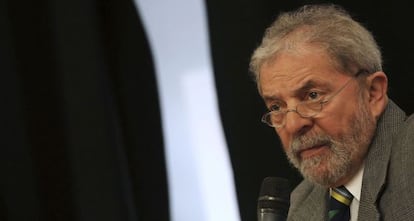“It wasn’t fair for Brazil to lose the World Cup because of protests”
Former president feels proud that no violent incidents have so far marred the soccer tournament


Luiz Inácio Lula da Silva, former president of Brazil, sat down with the group of foreign correspondents waiting for him in São Paulo, looked straight at the CNN correspondent, and said to her: “So, have you been to see the new stadiums? They’re nice, eh?”
Over the next two hours, the man who led the country for eight years (2003-2011) talked nonstop about politics and economics, but in particular about the World Cup, its organization, the secrets of Argentina’s forwards and the mood of the Brazilian team.
But his speech began with a reprimand for the national and international media for, in his view, exaggerating the criticism and the problems that blighted the championship before it even began.
“I am convinced that without all the bad press we would have gotten a lot more tourists,” he argued.
Things are not turning out as bad as many people were forecasting”
Although Lula said that current president Dilma Rousseff, of the Workers’ Party like himself, should be the one to make an assessment of the soccer event, he felt compelled to provide his own views, “because I am proud that everything is going the way it should.”
By that, he was referring to the absence of violence following weeks of street protests by students, workers and people who opposed the expense of the World Cup and demanded that the government invest in social services instead. Some protest leaders threatened to bring the country to a halt through strikes.
“Things are not turning out as bad as many people were forecasting,” he added.
A passionate fan of the Brazilian team and a soccer lover since he was a child, Lula confessed that he never suffered as much watching a game as he did when he saw the Brazil-Chile game in the round of 16, which the host country won on penalties. “Had it lasted any longer, they would have taken me to the emergency room with a heart attack,” he said.
There is a time for protests and a time for soccer”
The former union leader and champion of the left recalled that during the dictatorship, some of his colleagues in the underground would sit with their backs to the television screen when a game involving the national team was on. “It was their way of protesting something that they considered bad for the people. I disagreed, and got mad; I supported Brazil, which did not mean that I supported the dictatorship.”
Lula feels that the end result of the World Cup will not affect the elections scheduled for October. “This is soccer. It has not played a role on other occasions. There’s no reason why it should now. The people are wise. The only people who will get something out of it if the team wins are [coach] Felipão and the players.”
The former president said the protests have died down for an obvious reason: “The Brazilian people want the World Cup. I am not opposed to protesting. I have bursitis in both shoulders because of the blows I received when I participated in protests myself. But there is a time for protests and a time for soccer. And it wasn’t fair for the country to be left without the Cup because of the protests. Afterwards, I will be thrilled to have a country that keeps organizing and protesting.”
Tu suscripción se está usando en otro dispositivo
¿Quieres añadir otro usuario a tu suscripción?
Si continúas leyendo en este dispositivo, no se podrá leer en el otro.
FlechaTu suscripción se está usando en otro dispositivo y solo puedes acceder a EL PAÍS desde un dispositivo a la vez.
Si quieres compartir tu cuenta, cambia tu suscripción a la modalidad Premium, así podrás añadir otro usuario. Cada uno accederá con su propia cuenta de email, lo que os permitirá personalizar vuestra experiencia en EL PAÍS.
¿Tienes una suscripción de empresa? Accede aquí para contratar más cuentas.
En el caso de no saber quién está usando tu cuenta, te recomendamos cambiar tu contraseña aquí.
Si decides continuar compartiendo tu cuenta, este mensaje se mostrará en tu dispositivo y en el de la otra persona que está usando tu cuenta de forma indefinida, afectando a tu experiencia de lectura. Puedes consultar aquí los términos y condiciones de la suscripción digital.








































